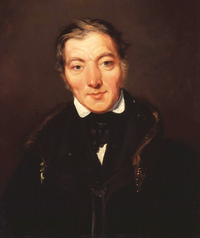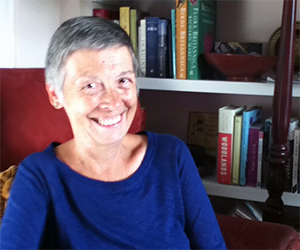Robert Owen: Pioneer Social Reformer
On July 25, 2015 I attended a family wedding in New
Lanark, a village near Glasgow in Scotland.
 |
| New Lanark, Scotland, 1984 (Wiki Commons, edited by original artist) |
By today’s standards, Robert Owen was a terrible
employer. According to the tourist information I received, he employed children
as young as ten, and they worked ten and a half hours a day, six days a week. But
by the standards of the day, he was a truly revolutionary reformer. At the time
it was not uncommon for children as young as four to work in factories in
extremely dangerous jobs, fourteen to sixteen hours a day seven days a
week.
 |
| Robert Own, aged about 50 (Wiki Commons) |
In 1816 Owen also established the first nursery
school in Britain. That’s probably one reason why the bride at the wedding—the daughter
of one of my cousins--chose this site. She is a former nursery school teacher
who now assesses student teachers.
The children of
Owen’s workers entered the schools he provided when they were as young as 18
months, and they continued their education until they were ten or (if their
parents could afford to keep them out of the factory) until they were twelve. For some reason Owen believed especially in music
and dance for children. He also opposed corporal punishment of children. He
also established an adult education institute for his workers.
Compared to the British policy toward the poor at
the time, Owen was a radical reformer. Nor did he confine his efforts to the
cotton mill he owned. He lectured on
social reform well into the nineteenth century, and he also helped establish
some of the first trade unions in Britain. My guess is he probably had far more
influence on British social thought than Karl Marx and Friedrich Engels, two
German-speakers who would not have been integrated into British society as Owen
was.
 As it happens, when I visited New Lanark I was also
reading Alison Light’s book, Common
People (Penguin 2014). Light is a
British social historian who decided to trace four lines of her ancestry,
through all four of her grandparents. There weren’t many records of them, as
they were indeed common folk, not the aristocrats fictionalized in Downton Abbey or self-indulgent artists
like the Bloomsbury crowd that we often take as representative of British
history.
As it happens, when I visited New Lanark I was also
reading Alison Light’s book, Common
People (Penguin 2014). Light is a
British social historian who decided to trace four lines of her ancestry,
through all four of her grandparents. There weren’t many records of them, as
they were indeed common folk, not the aristocrats fictionalized in Downton Abbey or self-indulgent artists
like the Bloomsbury crowd that we often take as representative of British
history.
Light was
born in 1955. One of her great-grandmothers spent the first eight years of her
life in a workhouse and died in an asylum for the “insane.” Workhouses were appalling
institutions where the poor were warehoused, given minimal if any food, and denied
education, fresh air, or any form of recreation. Families were also separated. The
idea was to make life so wretched for the poor that they would leave the
workhouse, thus not being a charge upon the parish.
Some of Light’s ancestors worked in the
eighteenth-century needle trade, manufacturing needles in their homes, risking
blindness from poor lighting or shards of metal flying into their eyes. Many
others led peripatetic lives, travelling all over Britain in search of work, enduring
periods of unemployment and sickness without any assistance from their rulers.
Light’s own father, born in the 1920s, had to leave school at 13 to go to work,
even though he wanted to stay.
 |
| Alison Light (AlisonLight.org) |
Many of the more ideological students of international
human rights still contend that “economic” human rights were introduced by the
Soviet Bloc and by less-developed countries, while “the West,” so-called,
focused only on civil and political rights. Reformers like Robert Owen in
Britain (and briefly in America, at a failed social colony called New Harmony
that he set up in Indiana in 1925) put the lie to this still common perception.
It is true that the United States persecuted and deported many of its social
reformers in the late nineteenth and early twentieth centuries, so that it does
not have a viable left-wing, social democratic political alternative today. But
social democracy and utopian socialism have a long history in most Western
countries.
Those whose ideological predispositions make them
despise “the West” as full of colonizers and exploiters would do well to read
Light’s history of her own family to find out what life was like for most
British people. They should also be more aware of reformers like Owen.
No comments:
Post a Comment